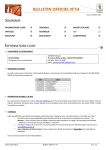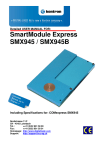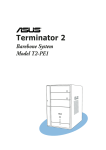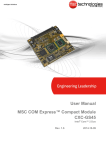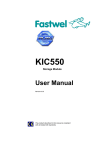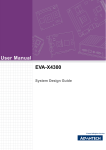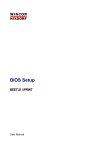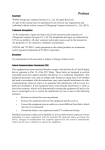Download CPB907 Mezzanine CPU Module COM Express® mini
Transcript
CPB907 Mezzanine CPU Module COM Express Express® mini, Type 10 Specification CPB907 Mezzanine CPU Module COM Express® mini, Type 10 User Manual Rev. 1.0 June 2015 The product described in this manual is compliant with all related CE standards. CPB907 Mezzanine CPU Module COM Express Express® mini, Type 10 Specification Product Title: CPB907 Document name: CPB907 User Manual Manual version: 0.1 Copyright © 2015 Fastwel Co. Ltd. All rights reserved. Revision Record Revision No. 0.1 1.00 Brief description of changes Initial version Item version: 1.2 Sections1.2 "General information", 1.5 "Board block diagram ", 1.7 "Module versions" – there were changes related to the RAM volume for various module versions (DDR2 RAM volume for CPB907-03 version has been increased up to 1 GB). Section 1.4 "Module power supply" – changes regarding requirements to power supply parameters. Section 1.8 "Delivery checklist" has been added with information on cooling system options. Section 1.9 "Additional accessories" – order number for development kit has been changed (KIB1283-02). Section 2.1 "General technical specifications for CPB907" – changes related consumption current of various versions of CPB907 were made, added information on weight and dimensions of the module with the installed cooling system. Board index CPB907 CPB907 Revision date March 2013 September 2013 Contact Information Fastwel Co. Ltd Fastwel Corporation US 108 Profsoyuznaya st., 55 Washington St. #310 Moscow 117437, Brooklyn, New York 11201 Russian Federation USA Tel.: +7 (495) 232-1681 +1 (718) 554-3686 Fax: +7 (495) 232-1654 +1 (718) 797-0600 E-mail: [email protected] [email protected] Web: http://www.fastwel.com/ http://www.fastwel.com/ Address: CPB907 Mezzanine CPU Module COM Express Express® mini, Type 10 Specification TABLE OF CONTENTS TRADEMARKS 7 OWNERSHIP RIGHTS 7 COPYRIGHT 7 TRANSPORTATION, UNPACKING AND STORAGE……………………………………………………………...…..8 Transportation………………………………………………………………………………………………………..…. 8 Unpacking………………………………………………………………………………………………………..……… 8 Storage……………………………………………………………………………………………………………..……. 8 MANUFACTURER’S WARRANTY………………………………………………………………………………………..9 Warranty Liability……………………………………………………………………………………………………..…9 Liability Limitation Right………………………………………………………………………………………………..9 Warranty Period…………………………………………………………………………………………………..….….9 Limitation of warranty liabilities…………………………………………………………………………….………….9 Returning a product for repair…………………………………………………………………………………….…...9 Notation Conventions…………………………………………………………………………………………………….10 Safety precautions………………………………………………………………………………………………...………11 SECTION 1: DESCRIPTION AND OPERATION OF CPB907 1. Description and operation of CPB907……………………………………………………………………………..12 1.1. Purpose……………………………………………………………………………………………….……..….…12 1.2. General Information …………..………………………………………………………………………………….12 1.3. Dimensions ……………………….………………………………………………………………………………16 1.4. Module power supply .…………………………………………………………………………………………...18 1.5. Block diagram of CPB907….…..………………………………………………….…………………….………18 1.6. Location of main components of CPB907……………………………………………………………………..19 1.7. Installation of CPB907 onto the carrier-board, cooling system……………………………………………...19 1.8. Versions……………………………………………………………………………………………………………21 1.9. Delivery checklist…………………………………………………………………………………………………22 1.10. Additional accessories…………………………………………………………………………………………22 1.11. Component parts of CPB907………………………………………………………………………………….23 SECTION 2: TECHNICAL CHARACTERISTICS 2.1. Technical specification..…………………………………………………………………………………...…….31 2.2. Allocation of hardware interrupts...…………………………………………………………………………….34 2.3. Module’s DMA channels…………………………………………………….………………………………….34 2.4. Address I/O space ………………………………………………………………………………………………35 2.5. Address memory space …………………………………………………………………………………….….36 2.6. Use of GPIO ports ……………………………………………………………………………….…………...…36 2.7 Tables of module connectors contacts………………………………………………………………………...38 SECTION 3: INTENDED USE OF CPB907 3. Intended use of CPB907……………………………………………………………………………….………….51 3.1. Installation of module switches…………………………………………………………………………………51 3.2. Basic Input-output system (BIOS)………………………………………………………………..…………... 52 Main…………………………………………………………………………………………………………………….53 Advanced (additional settings)………………………………………………………………………………………54 PCI Subsystem Settings……………………………………………………………………………………………..55 ACPI Settings…………………………………………………………………………………………………………56 CPU Configuration…………………………………………………………………………………………………...57 CPB907 Mezzanine CPU Module COM Express Express® mini, Type 10 Specification Hardware Monitoring………………………………………………………………………………………………..58 USB Configuration…………………………………………………………………………………………………..59 Thermal Configuration………………………………………………………………………………………………60 SDIO Configuration………………………………………………………………………………………………….61 SMSC Super IO Configuration……………………………………………………………………………………..62 Serial Port Console Redirection…………………………………………………………………………………...63 Chipset (additional settings)………………………………………………………………………………………..64 North Bridge Chipset Configuration…………………………………………………………………………….…65 South Bridge Chipset Configuration………………………………………………………………………………66 IOH Configuration……………………………………………………………………………………………….…..67 Boot……………………………………………………………………………………………………………….…...68 Security………………………………………………………………………………………………………….……69 Save & Exit……………………………………………………………………………………………………….…..70 3.3. Basic software……………………………………………………………………………………………………71 3.4. Service programs………………………………………………………………………………………………..71 ANNEX A……………………………………………………………………………………………………………….….73 CPB907 Mezzanine CPU Module COM Express Express® mini, Type 10 Specification List of tables Table 1-1: Requirements for power supply parameters …………………..……………………………………..…..18 Table 1-2: Options of CPB907 Module (differences of the supplied versions)…………………………………….21 Table 1-3: Additional accessories for CPB907 CPU Module………………………………………………………...22 Table 1-4: Values of frequency dividers for serial ports………………………………………………………………27 Table 1-5: Purpose of CPB907 LEDs…………………………………………………………………………………...29 Table 2-1: Requirements for electric power supply of CPB907……………………………………………………..31 Table 2-2: Characteristics of GPIO………………………………………………………………………………………31 Table 2-3: Characteristics of serial ports………………………………………………………………………………..31 Table 2-4: Characteristics of SATA port………………………………………………………………………………...32 Table 2-5: Characteristics of USB, Ethernet ports……………………………………………………………………..32 Table 2-6: Mechanical characteristics…………………………………………………………………………………..32 Table 2-7: Environmental conditions……………………………………………………………………………………33 Table 2-8: Addresses of hardware interrupts…………………………………………………………………………...34 Table 2-9: Module’s DMA channels……………………………………………………………………………………...34 Table 2-10: Allocation of address I/O space…………………………………………………………………………….35 Table 2-11: Memory device address……………………………………………………………………………………..36 Table 2-12: Purpose of GPIO ports of E6x0T processor……………………………………………………………….36 Table 2-13: Purpose of GPIO ports of EG20T chipset………………………………………………………………….37 Table 2-14: Purpose of contacts of COM Express connector (XS1)…………………………………………………..38 Тable 3-1: Purpose of switches for module configuration……………………………………………………………...51 Table 3-2: Description of “Main” menu……………………………………………………………………………………53 Table 3-3: Description of “Advanced” menu……………………………………………………………………………...54 Table 3-4: Description of “PCI Subsystem Settings” menu……………………………………………………………..55 Table 3-5: Description of “ACPI Settings” screen………………………………………………………………………..56 Table 3-6: Description of “CPU Configuration” screen…………………………………………………………………..57 Table 3-7: Description of “USB Configuration” screen…………………………………………………………………..59 Table 3-8: Description of “Thermal Configuration” screen………………………………………………………………60 Table 3-9: Description of “SDIO Configuration” menu…………………………………………………………………...61 Table 3-10: Description of “SMSC Super IO Configuration” menu……………………………………………………..62 Table 3-11: Description of “Chipset” menu………………………………………………………………………………..64 Table 3-12: Description of “North Bridge Chipset Configuration” menu……………………………………………….65 Table 3-13: Description of “South Bridge Chipset Configuration” menu………………………………………………66 Table 3-14: Description of “IOH Configuration” menu (additional settings)…………………………………………...67 Table 3-15: Description of “Boot” menu…………………………………………………………………………………...68 Table 3-16: Description of “Security” menu………………………………………………………………………………69 Table 3-17: Description of “Save & Exit” menu…………………………………………………………………………..70 Annex A. Terms and abbreviations…………………………………………………………………………………..…73 CPB907 Mezzanine CPU Module COM Express Express® mini, Type 10 Specification List of figures Fig. 1-1: Overall and fitting dimensions of CPB907 (bottom and side view) ........................................................ 16 Fig. 1-2: Overall dimensions of the carrier-board’s installation spot) …................................................................ 17 Fig. 1-3: Block diagram of CPB907……................................................................................................................ 18 Fig. 1-4: Location of main components of CPB907..................................................................................................19 Fig. 1-5: Installation of CPB907 onto the carrier-board……………………………………………………………….…19 Fig. 1-6: Dimensions of the heat-dissipation plate……………………………………………………………………….20 Fig. 1-7: Overall Dimensions of heat-sink (ACS30067) and dependency of its heat-transfer on the generated power and air-flow rate………………………………………………………………………………………………………………20 Fig. 1-8: Main 220-pin high-density connector of CPB907 module (viewed from the bottom of CPB907)…………23 Fig. 1-9: Connection of the COM-Express CPB907 and counterpart of the carrier-board……………………………23 Fig. 3-1: Screen during module booting (POST)……..…………………………………………………………………...52 Fig. 3-2: Screen of “Main” menu………………………………………………………………………………………….…53 Fig. 3-3: Screen of “Advanced” menu………………………………………………………………………………………54 Fig. 3-4: Screen of “PCI Subsystem Settings” menu……………………………………………………………………...55 Fig. 3-5: Screen of “ACPI Settings” menu………………………………………………………………………………….56 Fig. 3-6: Screen of “CPU Configuration” menu……………………………………………………………………………57 Fig. 3-7: Screen of “Hardware Monitoring” menu…………………………………………………………………………58 Fig. 3-8: Screen of “USB Configuration” menu……………………………………………………………………………59 Fig. 3-9: Screen of “Thermal Configuration” menu………………………………………………………………………..60 Fig. 3-10: Screen of “SDIO Configuration” menu………………………………………………………………………….61 Fig. 3-11: Screen of “SMSC Super IO Configuration” menu……………………………………………………………..62 Fig. 3-12: Screen of “Serial Port Console Redirection” menu…………………………………………………………....63 Fig. 3-13: Screen of “Chipset” menu………………………………………………………………………………………..64 Fig. 3-14: Screen of “North Bridge Chipset Configuration” menu……………………………………………………….65 Fig. 3-15: Screen of “South Bridge Chipset Configuration” menu………………………………………………………66 Fig. 3-16: Screen of “IOH Configuration” menu…………………………………………………………………………...67 Fig. 3-17: Screen of “Boot” menu…………………………………………………………………………………………...68 Fig. 3-18: Screen of “Security” menu…………………………………………………………………………………….…69 Fig. 3-19: Screen of “Save & Exit” menu…………………………………………………………………………………..70 All information in this document is provided for reference only, with no warranty of its suitability for any specific purpose. This information has been thoroughly checked and is believed to be entirely reliable and consistent with the product that it describes. However, Fastwel accepts no responsibility for inaccuracies, omissions or their consequences, as well as liability arising from the use or application of any product or example described in this document. Fastwel Co. Ltd. reserves the right to change, modify, and improve this document or the products described in it, at Fastwel's discretion without further notice. Software described in this document is provided on an “as is” basis without warranty. Fastwel assumes no liability for consequential or incidental damages originated by the use of this software. This document contains information, which is property of Fastwel Co. Ltd. It is not allowed to reproduce it or transmit by any means, to translate the document or to convert it to any electronic form in full or in parts without antecedent written approval of Fastwel Co. Ltd. or one of its officially authorized agents. Fastwel and Fastwel logo are trademarks owned by Fastwel Co. Ltd., Moscow, Russian Federation. Ethernet is a registered trademark of Xerox Corporation. IEEE is a registered trademark of the Institute of Electrical and Electronics Engineers Inc. Intel is a trademark of Intel Corporation. Pentium M and Celeron M are trademarks of Intel Corporation. Microsoft is a trademark of the Microsoft corporation. In addition, this document may include names, company logos and trademarks, which are registered trademarks and, therefore, are property of their respective owners. Fastwel welcomes suggestions, remarks and proposals regarding the form and the content of this Manual. CPB907 Mezzanine CPU Module COM Express Express® mini, Type 10 Specification Trademarks "Fastwel" logotype is a trademark belonging to Fastwel Group Co. Ltd., Moscow, Russian Federation. Besides, this document may contain names, corporate logotypes and trademarks being registered trademarks; consequently, property rights to them belong to their respective legitimate owners. Ownership Rights This document contains information being the property of Fastwel Group Co. Ltd. It can neither be copied nor transferred with the utilization of known media nor be stored in data storage and search systems without the prior written authorization of Fastwel Group Co. Ltd. To our best knowledge, the data in this document does not contain errors. However, Fastwel Group Co. Ltd cannot take responsibility for any inaccuracies and their consequences, as well as responsibility arising as a result of utilization or application of any diagram, product or example cited in this document. Fastwel Group Co. Ltd reserves the right to alter and update both this document and the product presented therein at its own discretion without additional notification. Copyright This document cannot be copied, reproduced, transferred or converted to any electronic or machine-readable form without prior written permission of Fastwel Co. Ltd CPB907 Mezzanine CPU Module COM Express Express® mini, Type 10 Specification TRANSPORTATION, UNPACKING AND STORAGE Transportation The device should be transported in original manufacturer’s separate packaging (transport packaging), which contains an individual antistatic bag and a cardboard box, in the closed transport (automobile, railway, air transportation in heated and pressurized compartments) in storage conditions 5 defined in the IEC 721-2-1 standard (GOST standard 15150-69) or in storage conditions 3 during sea transportation. The packaged modules should be transported in accordance with the shipping rules, specified for this particular type of transport. During handling and transportation operations, the packaged modules should not undergo sharp pounding, falls, shocks and exposure to atmospheric precipitation. The goods should be stored in a carrier vehicle in such a manner which will prevent their moving. Unpacking Prior to unpacking, after transportation at subzero temperature of ambient air the module(s) should be kept within 6 hours under storage conditions 1 defined in the IEC 721-2-1 standard (GOST standard 15150-69). It is prohibited to place the packaged module close to the heat source, prior to unpacking. Retain all original packaging at least until the warranty period is over. You may need it for shipments or for storage of the product. After unpacking the product, you should inspect it for visible damage that could have occurred during shipping or unpacking. If damage is observed (usually in the form of bent component leads or loose socketed components), contact Fastwel's official distributor from which you have purchased the product for additional instructions. Storage Module storage conditions for group 1 are defined in the IEC 721-2-1 standard (GOST standard 15150-69). CPB907 Mezzanine CPU Module COM Express Express® mini, Type 10 Specification MANUFACTURER’S WARRANTY Warranty Liabilities The Manufacturer hereby guarantees the product conformity with the requirements of the 4013025-72782511-09 technical conditions provided that the Consumer complies with the operating, storage, transportation and installation conditions and procedures, specified by the accompanying documents. The Manufacturer hereby guarantees that the products supplied thereby are free from defects in workmanship and materials, provided operation and maintenance norms were observed during the currently established warranty period. The Manufacturer's obligation under this warranty is to repair or replace free of charge any defective electronic component being a part of a returned product. Products that broke down through the Manufacturer's fault during the warranty period will be repaired free of charge. Otherwise the Consumer will be invoiced as per the current labor remuneration rates and expendable materials cost Liability Limitation Right The Manufacturer shall not be liable for the damage inflicted to the Consumer's property because of the product breakdown in the process of its utilization. Warranty Period The warranty period for the products made by Fastwel Group is 24 months since the sale date (unless otherwise provided by the supply contract). The warranty period for the custom-made products is 36 months since the sale date (unless otherwise provided by the supply contract. Limitation of warranty liabilities The above warranty liabilities shall not be applied: To the products (including software), which were repaired or were amended by the employees, that do not represent the manufacturer. Exceptions are the cases where the customer has made repairs or made amendments to the devices in the strict compliance with instructions, preliminary agreed and approved by the manufacturer in writing; To the products, broken down due to unacceptable polarity reversal (to the opposite sign) of the power supply, improper operation, transportation, storage, installation, mounting or accident. Returning a product for repair 1. Apply to Fastwel company or to any of the Fastwel's official representatives for the Product Return Authorization. 2. Attach a failure inspection report with a product to be returned in the form, accepted by the Manufacturer, with a description of the failure circumstances and symptoms. 3. Place the product in the consumer packaging (antistatic bag) and cardboard box, in which the product had been supplied. Failure to package in antistatic material will VOID all warranties of the Customer on a unilateral basis. 4. The customer pays for shipping the product to Fastwel or to an official Fastwel representative or dealer CPB907 Mezzanine CPU Module COM Express Express® mini, Type 10 Notation Conventions CE Conformity The CE marking is manufacturer's declaration that this product conforms to the requirements of the applicable EC directives. Caution: Electric Shock! This symbol warns about danger of electrical shock (> 60 V) when touching products or parts of them. Failure to observe the indicated precautions and directions may expose your life to danger and may lead to damage to your product. Please also see the below section, dedicated to regulations on operation with high voltage devices. Warning, ESD Sensitive Device! This symbol draws your attention to the information related to electro static sensitivity of your product and its components. To keep product safety and operability it is necessary to handle it with care and follow the ESD safety directions. Please also see the below section, dedicated to directions concerning handling the board and unpacking. Warning! This sign marks warnings about hot surfaces. The surface of the heatsink and some components can get very hot during operation. Take due care when handling, avoid touching hot surfaces! Warning! Information marked by this symbol is essential for human and equipment safety. Read this information attentively, be watchful.. Note This symbol and title marks important information to be read attentively for your own benefit. Specification CPB907 Mezzanine CPU Module COM Express Express® mini, Type 10 Specification General Safety Precautions This product was developed for fault-free operation. Its design provides conformance to all related safety requirements. However, the life of this product can be seriously shortened by improper handling and incorrect operation. That is why it is necessary to follow general safety and operational instructions below. Regulations on safe handling of high voltage Warning! All operations on this device must be carried out by sufficiently skilled personnel only. Caution, Electric Shock! Before installing this product into a system and before installing other devices on it, always ensure that yo switched off. This also refers to the installation of mezzanine boards. Always disconnect external power supply cables during all handling and maintenance operations with this serious danger of electrical shock. This also refers to other lead wires. Unpacking, Inspection and Handling Please read the manual carefully before unpacking the module or mounting the device into your system. K following: ESD Sensitive Device! Electronic modules and their components are sensitive to static electricity. Even a non-perceptible by hum discharge can be sufficient to destroy or degrade a component's operation! Therefore, all handling operat this product must be performed with due care, in order to keep product integrity and operability: n Preferably, unpack or pack this product only at EOS/ESD safe workplaces. Otherwise, it is important to be electrically discharged before touching the product. This can be done by touching a metal part of your system case with your hand or tool. It is particularly important to observe anti-static precautions when setting jumpers or replacing components. n If the product contains batteries for RTC or memory back-up, ensure that the module is not placed on conductive surfaces, including anti-static mats or sponges. This can cause shortcircuit and result in damage to the battery and other components. n Store this product in its protective packaging while it is not used for operational purposes. Unpacking The product is carefully packed in an antistatic bag and in a carton box to protect it against possible damage and harmful influence during shipping. Unpack the product indoors only at a temperature not less than +15°C and relative humidity not more than 70%. Please note, that if the product was exposed to the temperatures below 0°С for a long time, it is necessary to keep it at normal conditions for at least 24 hours before unpacking. Do not keep the product close to a heat source. Following ESD precautions, carefully take the product out of the shipping carton box. Proper handling of the product is critical to ensure correct operation and long-term reliability. When unpacking the product, and whenever handling it thereafter, be sure to hold the module preferably CPB907 Mezzanine CPU Module COM Express Express® mini, Type 10 Specification by the front panel, card edges or ejector handles. Avoid touching the components and connectors. Retain all original packaging at least until the warranty period is over. You may need it for shipments or for storage of the product. Initial Inspection Although the product is carefully packaged, it is still possible that shipping damages may occur. Careful inspection of the shipping carton can reveal evidence of damage or rough handling. Should you notice that the package is damaged, please notify the shipping service and the manufacturer as soon as possible. Retain the damaged packing material for inspection. After unpacking the product, you should inspect it for visible damage that could have occurred during shipping or unpacking. If damage is observed (usually in the form of bent component leads or loose socketed components), contact Fastwel's official distributor from which you have purchased the product for additional instructions. Depending on the severity of the damage, the product may even need to be returned to the factory for repair. DO NOT apply power to the product if it has visible damage. Doing so may cause further, possibly irreparable damage, as well as result in a fire or electric shock hazard. If the product contains socketed components, they should be inspected to make sure they are seated fully Section 1 1. Description and operation of CPB907 1.1. Purpose CPB907 CPU Module, implemented in the standard COM Express® mini format, provides developers of high-reliable small scale systems with such functions as compatibility with the x86 family, modern set of functional capabilities based on PCI Express / SATA / Gbit Ethernet / USB interfaces, hardware coding / decoding of video, low-energy consumption and ultra-small dimensions, as well as operation in the extended temperature range (-40...+85°С). The used Intel® Atom™ Queens Bay CPU platform, which contains E6x0T CPU and EG20T controller hub is characterized with high performance, although has a low energy consumption and heat release: E680T (1.6 GHz) TDP = 6 W, E620T (0.6 GHZ) TDP = 4.8 W), as well as announced by manufacturer operation in the extended temperature range (-40…+85ºC). The used solution requires neither a bulky heat-sink nor a forced cooling of the fan) while working in the whole operating temperature range, which is especially important when building the onboard control systems. The applied COM Express® mini form-factor has ultra-low dimensions (55 84 mm) and uses a standard COM Express® Type10 connector (fully compatible with COM Express® COM.0 Type 10 connector, the CPU& module fully conformal with the "PICMG® COM.0 COM Express® Module Base Specification Revision 2.1"). CPB907 is mainly used as a compute kernel with a wide range of I/O interfaces when building real-time systems, safety and communication onboard systems, video coding and decoding systems, manufacturing control systems, high-speed data acquisition as well as for other critical applications, designed for operation in harsh environments. The CPB907 CPU Module is installed on the carrier board, which provides access to the main I/O ports. All primary interface signals are routed to the high-density 220-pin connector (36318490-6, COM-Express Connector Socket 220-pin Type 10, TYCO). For more details on COM Express® standard, please visit PICMG® official website at: http://www.picmg.com/. 1.2. General Information Intel® Atom™ E6x0T Frequency: 0.6 GHz (E620T) / 1.6 GHz (E680T) CPU: IA32 x86 kernel 32 bit memory bus CPB907 Mezzanine CPU Module COM Express Express® mini, Type 10 Specification Level 1 cache (32 KB) Level 2 cache (512 KB) Hyper-Threading (2 Threads) Intel SpeedStep Support of Deep Power Down SIMD Extension 2&3 (SSE2, SSE3, SSSE3) Companion chip: Intel EG20T controller hub RAM: Soldered DDR2-800 SDRAM 1 GB graphics coprocessor: Frequency: 400 MHz 2D/3D acceleration Hardware video decoding (H.264, MPEG2, MPEG4, VC1, WMV9) Hardware video coding (H.264, MPEG4, H.263) 1 Independent connection of two displays Video memory is allocated from the system memory FLASH BIOS: 1 MB, modifiable within the system and a backup copy Integrated nonvolatile memory: 32 KB FRAM (SPI) for user data (only in CPB907-01/02) 8 KB FRAM (I2C) to store configuration When there is no battery, the CMOS settings are stored in the FRAM (I2C) FLASH-drive (only in CPB907-01): Connected to SATA interface (SATA1 port) Integrated 4 GB NAND Flash (SLC) Reading / writing speed - 100 / 80 MB/s Integrated wear control system and ECC Connector for MicroSD cards: Support of SD cards, SDHC, speed class 6 Hardware monotor: Module and CPU temperature monitoring (-55 … +125°С) Monitoring of principal supply voltages External fan control Digital accelerometer (only in CPB907-01/02): measuring acceleration along 3 axes Resolution: 14 / 8 bit Programmable measuring range ±2g / ±4g / ±8g/ Determination of events: free fall, movement, shaking, changing spatial orientation Generation of event trapping Digital pressure indicator (only in CPB907-01/02): Pressure measuring range: 50 … 115 KPa Conversion range: 1 ms Resolution: 0.15 KPa 1 only for CPB907-01, CPB907-02 (is stipulated by E620T CPU limitations) CPB907 Mezzanine CPU Module COM Express Express® mini, Type 10 Specification standard measurement accuracy ±1 KPa (at the temperature from -20 to +85°С, calibration testing during manufacturing of a microchip, fractional error is not rated). of COM Express® Type 10 connector: 3x ports PCIe x1 (PCIe Spec. Rev 1.0a), 2.5 GB/s; Signals 6x ports USB 2.0 (host); 1x port USB 2.0 (client); 2x ports SATA II (1.5-Gbps Gen. I & 3-Gbps Gen II); 2 Port "LAN 0": Gbit Ethernet; Port SPI (External Boot); Port "LVDS Ch. A": 18/24-bit, 1280х768 @ 60Hz; Port DDI: SDVO, 1920х1080 @ 50Hz; Port LPC (Spec. Rev. 1.1); Port SMBus (Spec. Rev. 2.0); Port I2C; Port HD Audio; Port "Speaker Out"; Port SDIO (compatible with GPIO ports); Port RS-232 (CMOS 3.3V, 256-byte FIFO, up to 4xMbps); Port RS-232 (CMOS 3.3V, 64-byte FIFO, up to 1xMbps) or CAN 2.0B Active (CMOS 3.3V, up to 1xMbps); Port "RTC battery". Real -Time - Clock 3 Watchdog timer: CPU integrated – 1 μs …10 minutes OS compatible: Microsoft™ MS-DOS®6.22, FreeDOS Linux 2.6 QNX 6.4x Microsoft™ Windows® CE 6.0 Microsoft™ Windows® XP (Embedded) Microsoft™ Windows® 7 (Embedded) console ports: COM1 / COM2 Supply voltage: +4.75…+20.0 V (primary) +5 V ±5% (Standby mode S3) 4 Short circuit and overvoltage protection. 2. only SATA0 for CPB907-01 (SATA1 port in version CPB907-01 is occupied by the integrated SATA SSD) 3. The battery is not included into the delivery checklist of CPB907, for operation of real-time clock it is required to install the battery or other uninterruptable power supply on the carrier-board. 4. Availability of a voltage source for standby mode 5 V (Standby) is not obligatory for module’s operation. CPB907 Mezzanine CPU Module COM Express Express® mini, Type 10 Specification Consumed power: 9.0 W for CPB907-01/-02 (operating mode, 12V @ 0.75А); 7.5 W for CPB907-03 (operating mode, 12V @ 0.62А); 1 W (standby mode, 5V @ 0.2А). Operating temperature range: -40°С … +85°С; Humidity: 5% … 95%, at +25°С without condensation; Shock-/ Vibration resistance: 50g / 5g (MTBF): No less than: 200 000 hours 5 Dimensions: No more than: 55.0 × 84.0 × 15.0 mm; Overall height, with cooling system (from the bottom surface of module plate to the upper surface heat-distributing plate or heat-sink): 13.0 mm (heat-distributing plate is installed, complies with the COM Express v2.1 specification); 15.0 mm (finned heatsink is installed); Module weight: No more than 45 g.; Weight of the module with cooling system: No more than 125 g (heat-distributing plate is installed) не более 145 г (установлен радиатор с оребрением) 5. The value is calculated according to: Telcordia Issue 1 model, Method I Case 3, for continuous operation at a surface location, under normal environmental conditions (Moderately Cold climate 4) and at ambient temperatures 30°С. CPB907 Mezzanine CPU Module COM Express Express® mini, Type 10 Specification 1.3. Dimensions This subsection specifies overall and fitting dimensions of CPB907 and carrier-board. Maximum allowed height of components, installed on the upper side of the carrier-board directly under CPB907, amounts to: - 5 mm when there is an 8 mm mating COM Express connector (3-6318491-6, TYCO) installed on the carrier-board; - 2 mm when there is an 8 mm mating COM Express connector (3-1827253-6, TYCO) installed on the carrier-board. Fig. 1-1: Overall and fitting dimensions of CPB907 (bottom and side view) This figure shows CPB907 module as viewed from the side of the primary COM-Express Connector Socket 220-pin. CPB907 Mezzanine CPU Module COM Express Express® mini, Type 10 Specification Fig. 1-2: Overall dimensions of the carrier-board’s installation spot This figure with dotted lines shows the location of CPB907 on the carrier-board, as well as overall dimensions of the installation spot. CPB907 Mezzanine CPU Module COM Express Express® mini, Type 10 Specification 1.4. Module power supply Module power supply should correspond to the requirements, specified in the table 1-1. Power is supplied to the module via COM Express connector. The power supply source should ensure starting current and load current, specified in the table below depending on the module version (starting currents and load currents are specified at rated voltage values). When choosing the power supply, it is required to consider starting current of CPB907 and consumption current of mezzanine modules as well as other devices, connected to the ports of CPB907. Input "+12 V" is equipped with short-circuit (7.5 А) and overvoltage protection (up to 25 V). Table 1-1: Requirements for power supply parameters Version Power supply Voltage limit voltage, V values, V CPB907-01 +5 (Standby) от +4.75 до +5.25 CPB907-02 CPB907-03 +12 от +4.75 до +20 Load current, A Starting current 0.15 @ 5 V 0.5 2.0 А @ 5 V 0.8 А @ 12 V 0.5 А @ 20 V 2.0 * Consumption current information is preliminary. 1.5. Block diagram of CPB907 Fig. 1-3: Block diagram of CPB907 1.6. Location of main components of CPB907 CPB907 Mezzanine CPU Module COM Express Express® mini, Type 10 Specification Fig. 1-4: Location of main components of CPB907 Location of the module’s components can differ from the one on the figure. Purposes of module’s connectors are described in the Section “Integral parts of CPB907” and in section Tables of module’s connector’s contacts. Purposes of X1…X2 switches are specified in the section Installation of module’s switches. 1.7. Installation of CPB907 onto the carrier-board, cooling system Fig. 1-5: Installation of CPB907 onto the carrier-board CPB907 Mezzanine CPU Module COM Express Express® mini, Type 10 Specification The heat-distribution plate (order number code contains "-R1") is mounted on the top side of the board in accordance with the COM Express specification. The maximum height of components on the top side of the CPB907 board is defined by the COM Express standard and amounts to 5 mm. The CPB907 module comes with a heat-distribution plate or a heat-sink with fins. The maximum overall height of the module with the installed heat-distribution plate (exclusive of COM Express connector) is 13 mm. Heat is transferred to the heat-distribution plate is transferred from the following microchips: E6x0T CPU, EG20T controller hub, power management integrated circuits (PMIC), DDR2 memory chips mounted on the top side of the CPB907 board. Additionally, the heat-distribution plate enables to mount a heat-sink on it. The maximum height of the heat-sink amounts to 8 mm, thermal resistance of the heat-sink is equal to 5 C/W (without forced cooling /fan). The heat-sink is supplied as an optional accessory (ACS30067). When installing the hat-sink from a kit ACS30067 onto the heat-distribution plate, the total overall height of the module (exclusive of COM Express Connector) will be 21 mm. It is also possible to include a heat-sink with ribs into the delivery package instead of the heatdistribution plate (order number code contains "-R2"), ensuring the module operation in the entire temperature range without setting an additional heat-sink and heat transfer to the enclosure. When using the "-R2" ribbed heat-sink, a total overall height of the module (exclusive of COM Express Connector) is 15 mm. Fig. 1-6: Dimensions of the heat-dissipation plate Fig. 1-7: Overall Dimensions of heat-sink (ACS30067) and dependency of its heat-transfer on the generated power and air-flow rate CPB907 Mezzanine CPU Module COM Express Express® mini, Type 10 Specification 1.8. Versions CPB907 CPU module has six major versions. SPB907-01-E1.6-RAM1024-SSD4G-R1-I - CPB907 CPU Module (COM Express® mini, Type10), Intel E680T 1.6 GHz, 1 GB DDR2 SDRAM, 4GB SSD, slot MicroSD, FRAM 32 KB, accelerometer, pressure sensor, heat-distribution plate. SPB907-01-E1.6-RAM1024-SSD4G-R2-I - CPB907 CPU Module (COM Express® mini, Type10), Intel E680T 1.6 GHz, 1 GB DDR2 SDRAM, 4GB SSD, slot MicroSD, FRAM 32 KB, accelerometer, pressure sensor, heat-sink with fins. SPB907-02-E1.6-RAM1024-R1-I - CPB907 CPU Module (COM Express® mini, Type10), Intel E680T 1.6 GHz, 1 GB DDR2 SDRAM, a slot MicroSD, FRAM 32K, accelerometer, pressure sensor, the heat-distribution plate. SPB907-02-E1.6-RAM1024-R2-I - CPB907 CPU Module (COM Express® mini, Type10), Intel E680T 1.6 GHz, 1 GB DDR2 SDRAM, a slot MicroSD, FRAM 32K, accelerometer, pressure sensor, heat-sink with fins. SPB907-03-E0.6-RAM1024-R1-I - CPB907 CPU Module (COM Express® mini, Type10), Intel E620T 600 MHz, 1 GB DDR2 SDRAM, a slot MicroSD, heat-distribution plate. SPB907-03-E0.6-RAM1024-R2-I - CPB907 CPU Module (COM Express® mini, Type10), Intel E620T 600 MHz, 1 GB DDR2 SDRAM, a slot MicroSD, heat-sink with fins. Differences of versions are summarized in the table below: Table 1-2: Options of CPB907 Module (differences of the supplied versions) Order number CPU Nonvolatile memory Integrated SSD SATA ports Sensors Cooling system in kit СPB907-01E1.6RAM1024SSD4G-R1-I СPB907-01E1.6RAM1024SSD4G-R2-I СPB907-02E1.6RAM1024R1-I СPB907-02E1.6RAM1024R2-I СPB907-03E0.6RAM1024R1-I СPB907-03E0.6RAM1024R2-I E680T, 1.6 GHz FRAM 32 KB 4GB 1 x port (COM Express) Acceleration and temperature sensors Heatdistribution plate Heat-sink with fins - 2 x ports (COM Express) Heatdistribution plate Heat-sink with fins E620T, 0.6 GHz - Temperature sensors Heatdistribution plate Heat-sink with fins CPB907 Mezzanine CPU Module COM Express Express® mini, Type 10 Specification Options available: * Information on the availability of pre-installed QNX operating system is provided upon individual request. ** If the module is ordered without any kits, it is required to specify "\OEM" option at the time of order. 1.9. Delivery checklist Standard delivery checklist of CPB907 CPU Module includes: 1. CPB907 Module; 2. Heat-distribution plate / Heat-sink with fins; 3. Assembly kit for installation of COM Express mini modules onto the carrier-board (5 and 8 mm); 4. Package. 1.10. Additional accessories Table 1-3: Additional accessories for CPB907 CPU Module KIB1283-02 Developer’s kit for COM Express mini modules ACS30067 Heat-sink for COM Express mini modules (installed onto the heat-distribution plate) CPB907 Mezzanine CPU Module COM Express Express® mini, Type 10 Specification 1.11. Component parts of CPB907 1.11.1. Main high-density COM Express connector (XS1) All primary interfaces are routed to 220-pin high-density connector (3-6318490-6, COM Express Connector Socket 220-pin Type I, TYCO). Below is the view from the back of the CPB907 board, overlooking the COM Express connector. Fig. 1-8: Main 220-pin high-density connector of CPB907 module (viewed from the bottom of CPB907). As a counterpart of the COM Express connector, it is recommended to use on the carrier-board: 3-1827253-6 (TYCO) – distance between the CPB907 board and the carrier-board: 5 mm 3-6318491-6 (TYCO) – distance between the CPB907 board and the carrier-board: 8 mm. Fig. 1-9: Connection of the COM-Express CPB907 and counterpart of the carrier-board CPB907 Mezzanine CPU Module COM Express Express® mini, Type 10 Specification 1.11.2. E620T / E680T CPU CPB907 is built on the basis of x86-compatible 32-bit Intel® Atom™ E620T / E680T CPU (depending on CPB907 version), manufactured on the basis of 45 Nm technology, with low power consumption and industrial operating temperature range (-40 … +85ºС). Operating clock frequency – 600 MHz (E620T) /1.6 GHz (E680T). For more information please visit manufacturer’s website at: http://ark.intel.com/ru/products/series/52490. It represents a highly-integrated solution, combining Intel® Atom™ core, 32-bit DDR2 SDRAM memory controller (up to 2 GB, 400 MHz), graphics subsystem with 2D/3D acceleration (video processor frequency: 400 MHz), extension buses 4 PCIe x1 (1.0a) and LPC (1.1), High Definition Audio subsystem, SMBus, SPI, up to 14 GPIO lines, Real Time Clock. The CPU has implemented a hardware support of video coding (MPEG-4 / H.263 / H.264 – only in E680T), as well as hardware acceleration of video decoding (H.264 / MPEG2 / MPEG4 / VC1 / WMV9 – in E620T and E680T). 1.11.3. EG20T Controller Hub The module uses Intel® EG20T (Topcliff) controller hub, manufactured in accordance with 90 Nm technology, with low power consumption and industrial temperature range (-40 … +85ºС). For exchanging data with CPU PCIe x1 bus will be used. EG20T represents a highly-integrated controller of such interfaces as: 6 x USB 2.0 (host), USB 2.0 (device), Gbit Ethernet (MAC), 2 x SATA II, 2 x SDIO, SPI, I2C, 4 x UART, CAN. 1.11.4. Random Access Memory (RAM) As system memory, the CPB907 module uses 1GB DDR2 SDRAM operating at a frequency of 400 MHz. Installation of memory extension module is not provided. 1.11.5. FLASH BIOS Read-Only Memory In order to store the Basic I/O system (hereinafter referred to as the BIOS), the module uses 2MB SPI-FLASH (SST25VF016B). Loading from and external SPI-FLASH microchip installed onto the carrier board, is supported too. 1.11.6. Non-Volatile Memory For storing user data in the module, FRAM 32 KB (Ramtron, FM25L256) non-volatile memory is provided, and is will be used as a replacement for a standard non-volatile random access memory. For exchanging data with SPI FRAM 32 KB, SPI interface of EG20T chipset will be used. Manufacturer guarantees 100 trillion read/write cycles, which, within such application mode, will be equivalent to ~ 340 years of application (in case of continuous cyclic write-read procedure). For storing this configuration, a separate 8 KB FRAM non-volatile memory will be used, which is connected to the CPU SMBus interface. If there is no battery, CMOS settings will be stored in FRAM. This memory could be additionally used for storing calibration factors of acceleration sensor. CPB907 Mezzanine CPU Module COM Express Express® mini, Type 10 Specification A separate 512 Kb 25LC512-I/SN microchip of EEPROM memory will be used for storing MACaddress of Gbit Ethernet controller integrated into EG20T chipset. 1.11.7 RTC, CMOS Real-time clock is integrated into CPU. In case of the switched off power supply, clock operability is ensured via "RTC battery" port of COM-Express connector, from the carrier-board. Battery current consumption amounts to 12 µA (standard value), which corresponds to 2 years of use from a standard CR2032 lithium-battery of 220 mAh, provided that the module has been in off state for 24 hours (battery should be installed into the carrier-board). However, an actual battery service life relies heavily on ambient temperature, as well as on the fact, how long time system has been off. Note: It is recommended to change the battery each 2 years of operation, not awaiting its end of life. Note: When changing battery, observe the polarity (“+” should be on top). The used battery should be disposed in accordance with the established regulations. BIOS settings are stored in a separate non-volatile memory FRAM (8 KB). 1.11.8. Slot for MicroSD cards The module enables the use of MicroSD Card as drive (SDSC, SDHC, Spec. v1.1, v2.0), for this purpose, the top side of the board has a relevant MicroSD (XS2) connector. "Push-Push" socket (DM3B-DSF-PEJ, Hirose) is used. This type of connector allows for a horizontal card removal. The connector located in such a way that availability of a heatdistribution plate or heat-sink would not prevent removal of the MicroSD card. 1.11.9. Integrated SATA SSD As an option (only in the delivered configuration CPB907-01), the module is equipped with 4GB SATA SSD (port SATA1 of EG20T controller hub). Controller and 2 microchips SLC NAND Flash are integrated in a single chip. Read / write speed is 100 / 80 MB/s, there is an integrated wear control system and hardware error correction mechanism ECC (8/15 bit to 512 byte, 16/30 bit to 1 KB). MTBF of the drive amounts to 2 000 000 hours. CPB907 Mezzanine CPU Module COM Express Express® mini, Type 10 Specification 1.11.10. PCI Express port (XS1) 3x ports PCIe x1 are routed to the COM Express connector. Specification PCIe Spec. Rev 1.0a is supported, data exchange speed – up to 2.5 GB/s. 1.11.11. SATA port (XS1) 2x SATA ports (in the delivered configuration CPB907-01 there is only 1x SATA port (SATA0) available, since SATA0 port in CPB907-01 is used for the connection of integrated 4 GB SSD), are routed to the COM Express connector. Support of SATA I, SATA II specifications. SATA0/SATA1 ports of EG20T controller hub are used. 1.11.12. USB 2.0 port (XS1) The module has 6 x USB Host ports, as well as 1x USB Device port with support of USB 1.1 and USB 2.0 specifications. The USB ports are routed to the COM Express connector. 1.11.13. Gbit Ethernet port (XS1) The module has 1x Gbit Ethernet port. Gigabit Ethernet MAC controller integrated into the controller hub is used. 88E1510-A0-NNB2I000 (Marvell) is used as PHY. Port is routed to the COM Express connector. Support of the following operation modes: 10/100/1000 Mb. 1.11.14. COM1 / COM2 (XS1) serial ports The CPU module has two asynchronous serial ports: COM1 and COM2. COM1 – 2-wire interface UART (CMOS, 3.3V), speed up to 4Mb/s, FIFO buffer 256 byte (EG20T, UART0). COM2 – 2-wire interface UART (CMOS, 3.3V), speed up to 1Mb/s, FIFO buffer 64 byte (EG20T, UART1) or CAN 2.0B (CMOS, 3.3V), speed up to 1Mb/s (EG20T, CAN-port). Configuration of the port (UART or CAN) is selected by software, using BIOS Setup settings, by default - UART. The both ports are routed to the COM Express connector and can be used for console input/output and loading files (COM1 port will be used as a console port, by default). Overvoltage protection up to 14 V (which is associated with COM-Express Type 1 and Type 10 compatibility requirements) is implemented. The UART ports are fully software-compatible with the UART 16550 version. CAN port is compatible with "BOSCH CAN Protocol Version 2.0B Active" (standard and extended format) in accordance with ISO 11519, ISO 11898, and SAEJ2411. In order to enable the ports to operate within networks RS-232, RS-422/485 or CAN it is required to equip the carrier-board with relevant transmitter-/receiver units. Data exchange speed over serial ports can be set in the BIOS Setup settings. The data exchange speed is determined by the value of CPU frequency divider register. The divider’s value will be calculated according to the following formula: DIV = F / BR, BR=F / (DIV×16) where F – is an internal generator’s frequency [MHz]; F = (12.288, 25, 48) ×PLL2VCO×BAUDDIV ( PLL2VCO = 1…6, BAUDDIV = 1…16 ) maximum value F = 192 MHz CPB907 Mezzanine CPU Module COM Express Express® mini, Type 10 Specification DIV – divider’s value (minimum value DIV = 1); BR – exchange rate required [bit/s]. Attention! The receiver tolerates deviations of data exchange rate by 3,0% downward and by 2,5% - upward. The below table has values frequency divider for a number of data exchange rates: Table 1-4: Values of frequency dividers for serial ports 1.11.15. LVDS and SDVO ports (XS1) For connection of LCD(TFT)-panels, LVDS interface is used. This interface is routed to the COM Express connector. Color depth may amount to 24 bits (18-bit mode is also supported). Maximum resolution: 1280 х 768 @ 60Hz. LVDS interface may be routed directly to the LVDS connector on carrier-board. CPB907 Mezzanine CPU Module COM Express Express® mini, Type 10 Specification SDVO interface is also routed to the COM Express connector. Maximum resolution: 1920 х 1080 @ 50Hz. For connection of the video units, the carrier-board should be equipped with a relevant converter: SDVO – CRT (e.g. CH7317B Chrontel), SDVO – DVI, SDVO – HDMI, SDVO – LVDS (e.g. CH7308B Chrontel). Independent operation of two displays is supported. For operation of LVDS-panel or other video output devices in Linux, WindowsXP, Windows7 operating systems, it is required to use Intel IEMGD suite, which latest version can be downloaded from the official website at: http://www.intel.ru. 1.11.16. HDA port (XS1) For connection of audio devices, High Definition Audio interface (controller is integrated into the EG20T controller hub) is routed to the COM Express connector. Operation of the audio port requires the carrier board to have a relevant audio codec (e.g. CS4207 Cirrus Logic) installed. 1.11.17. SDIO / GPIO port (XS1) GPIO port of the controller hub (EG20T) is used. The port is intended for input/output of 8 logic signals. Interrupt generation becomes possible over each of the GPIO lines. The port is software-compatible with SDIO port, on COM Express connector (CMOS level, 5V Tolerant). Port configuration is software-selectable, in BIOS Setup settings (GPIO port, by default). 1.11.18. Acceleration, pressure and temperature sensors, hardware monitor A capacitive micromachined accelerometer MMA8451Q (Freescale) is used as acceleration sensor .This device, having 8/14 bit resolution, enables to measure acceleration along three axes, вибраций в диапазонах 2/4/8 g, determine slope angle, free fall, detect pulse and jolts. Relative measurement errors are not rated. 6 The module is also equipped with a Miniature I2C Digital Barometer 7 MPL115A2 (Freescale), which provides accurate pressure measurements from 50 to 115 kPa (standard measuring precision is 1 kPa, with the operating temperature range that spans from -20 to +85°С, resolution of 0.15 KPa). Calibration of the device is carried out by the manufacturer during production process. Relative measurement errors are not rated. The acceleration and pressure sensors are connected to SMBus of the CPU and enable generating system interrupts for events. The measurement errors are not rated, the standard measurement errors are defined by characteristics, stated by device manufacturers. The used LM87 and LM96163 hardware monitors enable to control module’s main voltages, module’s and CPU temperature, as well as to control an external fan. 6 only in CPB907-01, 7 only in CPB907-01, CPB907-02 CPB907-02 CPB907 Mezzanine CPU Module COM Express Express® mini, Type 10 Specification 1.11.19. Watchdog timer The module uses 1 hardware watchdog timer, integrated into the processor chip, with the modifiable actuation range from 1 µs to 10 minutes. A logic signal of watchdog timer actuation (CMOS, 3.3В - при срабатывании сторожевого таймера состояние линии переходит в логическую единицу) is routed to the COM Express connector. 1.11.20. Reset and power supply monitoring Module reset signal is generated from the following sources: From supervisor at the time of power up; From the external reset signal from the COM Express connector; From the watchdog timer. CPU switch from the standby mode (from S3 state to S0 state) can be carried out from the following sources, from COM Express connector: Gbit Ethernet 0 port (Magic Packet); COM1 port; GPIO port; USB port; WAKE# signal. 1.11.21. LPC port (XS1) LPC port includes all signals of LPC extension bus, except for DRQ signal and is routed to the COM Express connector (direct access mode is not supported by LPC bus controller). Support of LPC Rev 1.1. specification. 1.11.22. SMBus and I2C ports (XS1) SMBus CPU port is routed to the relevant port of COM Express connector. Additionally, lines of I2C interface of EG20T controller hub are routed to the COM Express connector. 1.11.23. PC-buzzer port (XS1) PC-buzzer port is routed to the COM Express connector. 1.11.24. LEDs Table 1-5: Purpose of CPB907 LEDs LED HL1 HL2 HL3 Function Diagnostic input power supply LED (green) LED of module’s MicroSD card activity (green) LED of integrated SATA SSD activity (green) During module’s normal operation, after power-up, the HL1 LED is lighted with green. HL1 is off when there is a short circuit or there is no input power supply voltage of "12 V". The HL2-HL3 LEDs are flashing when addressing to the relevant devices. CPB907 Mezzanine CPU Module COM Express Express® mini, Type 10 SECTION 2 TECHNICAL CHARACTERISTICS Specification CPB907 Mezzanine CPU Module COM Express Express® mini, Type 10 Specification 2. Technical specification Table 2-1: Requirements for electric power supply of CPB907 Electric supply requirements Power supply voltage “+ 12V” (principal voltage) +12 V (+4.75 … +20 V) 8 Power supply voltage "+5 V" STANDBY (standby +5 V (+4.75 … +5.25 V) mode) Consumption current over power supply voltage, no more than: CPB907-01, CPB907-02 1800 mA @ +5V (9.0 W) 750 mA @ +12V (9.0 W) 450 mA @ +20V (9.0 W) 200 mA @ +5V STANDBY (1 W) CPB907-03 1500 mA @ +5V (7.5 W) 625 mA @ +12V (7.5 W) 375 mA @ +20 В (7.5 W) 200 mA @ +5 В STANDBY (1 W) Maximum available current consumed over external circuits (standard value at +25C, limited by the installed resettable fuse): SPI_POWER (XS1) 100 mA Table 2-2: Characteristics of GPIO Digital I/O Output voltage, Logical 1 max. 3.3 V Input voltage, Logical 0 max. 0.8 V Input voltage, logical 1 min. 2.0 V, max. 5.5 V Output voltage, Logical 0 (at the current of 8 mA) max. 0.4 V Output voltage, Logical 1 (at the current of 8 mA) min. 2.4 V Table 2-3: Characteristics of serial ports Maximum exchange rate via COM1 serial port (UART) Maximum exchange rate via COM2 serial port (UART) Maximum exchange rate via COM2 serial port (CAN) 8 Serial ports 4 Mb/s 1 Mb/s 1 Mb/s Additional power supply voltage +5 В STANDBY is not necessary for module’s operation CPB907 Mezzanine CPU Module COM Express Express® mini, Type 10 Specification Table 2-4: Characteristics of SATA port SATA port Up to two devices SATA0, SATA1 ports Supported operation modes of SATA devices SATA Gen.1 (1.5 Gb/s), SATA Gen.2 (3.0 Gb/s), 9 Volume of the integrated SSD (SATA1 port) 4 GB (NAND Flash, SLC) with the integrated wear control system and hardware error correction mechanism ECC (8/15 bit to 512 byte, 16/30 bit to 1 KB). MTBF of the drive amounts to 2 000 000 hours. Number of external SATA devices Table 2-5: Characteristics of USB, Ethernet ports USB, Ethernet ports USB Host, 6x ports USB Device, 1x port Types of supported USB-devices 1.1, 2.0 Exchange rate over Ethernet channel 10/100/1000 Mb/s LED indication of Ethernet-channel activity LEDs on the carrier-board: Activity (ACTIVE) and communications link state (LINK). Type of USB ports Table 2-6: Mechanical characteristics Mechanical characteristics Vibration resistance 5 g (acceleration amplitude) Single shock resistance 100 g (peak acceleration) Multiple shocks resistance 50 g (peak acceleration) Overall dimensions of module, no more than 55 84 15 mm Overall height of the module with cooling system, 13 mm (corresponding to the COM Express exclusive of COM Express connector specification) Module weight, no more than 45 g (without MicroSD card and heat distribution plate) Module weight with cooling system, no more than 125 g (heat distribution plate is installed) 145 g (finned heat-sink is installed) 10 MTBF No less than 200 000 hours 9 Only for the version CPB907-01. values are calculated according to the Telcordia Issue 1 model, Method I Case 3, for continuous operation, located on the ground, at normal environmental conditions (Moderately Cold Climate 4, in accordance with the GOST standard 15150-69) and at ambient temperature 30°С. 10 MTBF CPB907 Mezzanine CPU Module COM Express Express® mini, Type 10 Specification Table 2-7: Environmental conditions Operating temperature range Module storage conditions Relative humidity Environmental conditions -40..+85C 1 according to the GOST 15150-69 standard Up to 80 %, without moisture condensation CPB907 Mezzanine CPU Module COM Express Express® mini, Type 10 2.2. Allocation of hardware interrupts Table 2-8: Addresses of hardware interrupts # Source by default NMI IRQ0 Reserved (System Time Clock) IRQ1 PS/2 Keyboard IRQ2 Reserved (coding) IRQ3 COM2 IRQ4 COM1 IRQ5 External devices IRQ6 USB IRQ7 External devices IRQ8 RTC IRQ9 External devices IRQ10 External devices IRQ11 External devices IRQ12 PS/2 Mouse IRQ13 Reserved (Coprocessor support) IRQ14 IRQ15 - 2.3. Module’s DMA channels Table 2-9: Module’s DMA channels # DRQ0 DRQ1 External devices DRQ2 External devices DRQ3 External devices DRQ5 External devices DRQ6 External devices DRQ7 External devices Alternative sources Watchdog Timer (WDT) - Specification CPB907 Mezzanine CPU Module COM Express Express® mini, Type 10 2.4. Address I/O space Table 2-10: Allocation of address I/O space Specification CPB907 Mezzanine CPU Module COM Express Express® mini, Type 10 Specification 2.5. Address memory space Table 2-11: Memory device address Address Device 00000 – 9FFFFh DOS A0000 – BFFFFh C0000 – СFFFFh D0000 – DFFFFh E0000 – EFFFFh System BIOS F0000 – FFFFFh System BIOS Address 10 0000 – MEMORY TOP * MEMORY TOP * – FFE0 0000 FFE0 0000 – FFFF FFFFh Device DRAM PCI High BIOS Notes DOS Area 640 Kbyte Область видеопамяти 128 Kbyte Extended System BIOS area 64 KB (16 KB х 4) System BIOS area 64 KB Notes DDR2 SDRAM PCI High BIOS Area 2 Mbytes (mapped to PCI) * Set volume DDR2 SDRAM 1024 MB. 2.6. Use of GPIO ports Microchip of E6x0T CPU contains 2 I/O ports – GPIO (General Purpose Input / Output), available for the user via microchip’s internal registers. The first "GPIO" port represents 5 I/O lines, the second one "GPIO_SUS"– 9x lines each of them can be adjusted as input or output by programming the registers of a relevant port. Lines of "GPIO_SUS" port opposed to the "GPIO" port lines retain their states, if they were adjusted to the output when switching to the standby mode (S3). In addition, lines of GPIO port of GPIOP[11:0] have been activated. Lines of GPIOP[7:0] are routed to the COM Express connector (multiplexed with SDIO lines). Purpose of GPIO ports used is given in the table below. Table 2-12: Purpose of GPIO ports of E6x0T processor Line of I/O port GPIO_4 Direction of I/O line Input / Output GPIO_3 Input GPIO_2 Input Description Watchdog timer actuation flag Front – actuation has been carried out Configuration of COM2 port (SER1_TX/SER1_RX lines): 1 – CAN interface 2 – UART interface (by default) Not used CPB907 Mezzanine CPU Module COM Express Express® mini, Type 10 Line of I/O port GPIO_1 Direction of I/O line Input GPIO_0 GPIO_SUS_8 GPIO_SUS_7 Input Input Input/Output GPIO_SUS_6 GPIO_SUS_5 GPIO_SUS_4 Input/Output Input Input / Output GPIO_SUS_3 Output GPIO_SUS_2 Output GPIO_SUS_1 Output GPIO_SUS_0 Output Specification Description USB HOST PRESENT (logics for determining USB HOST availability at the time of CPB907 module connection as USB Device, USB OTG mode). 1 – CPB907 USB HOST is connected, 0 – CPB907 USB HOST is not connected. Not used Not used Reset of Ethernet PHY controller: 1 – Normal module operation, 0 – Reset. The line is set as input by default. Not used Not used LVDS_I2C_DATA Control of LVDS panel, I2C_DATA signal LVDS_I2C_CLK Control of LVDS panel, I2C_CLK signal. LVDS_BKLT_CTRL Signal of LVDS panel illumination control. LVDS_BKLT_EN Switching on the power of the illumination of LVDS panel. LVDS_VDDEN Switching on the power of the LVDS panel. Table 2-13: Purpose of GPIO ports of EG20T chipset Line of I/O port GPIO_11 GPIO_10 GPIO_9 Direction of I/O line Input Input Input GPIO_8 Input / Output GPIOP_7… GPIOP_0 Input / Output Description Reserved Reserved CB_BATLOW# 1 – normal module operation, 0 – Low battery charge level. Configuration of GPIO port CB_GPIO_SEL# 1 – SDIO interface, 0 – GPIO interface (by default). Lines are routed to GPIO port of COM Express connector CPB907 Mezzanine CPU Module COM Express Express® mini, Type 10 2.7 Tables of module connectors contacts 11 2.7.1 Table of contacts of COM Express Type 10 (XS1) Table 2-14: Purpose of contacts of COM Express connector (XS1) 11 Hereinafter referred to as: symbol # in the signal name – active logic “0” level. Specification CPB907 Mezzanine CPU Module COM Express Express® mini, Type 10 XS1: COM Express Connector Socket 220-pin Type I (3-6318490-6, TYCO) Specification CPB907 Mezzanine CPU Module COM Express Express® mini, Type 10 Specification CPB907 Mezzanine CPU Module COM Express Express® mini, Type 10 Specification * SATA1 port is available only in CPB907-02, CPB907-03. 2.8.1 HAD interface (High Definition Audio) High Definition Audio interface is used for the connection of an external audio codec on the carrier- board. Signal AC/HDA_RST# AC/HDA_SYNC AC/HDA_BITCLK AC/HDA_SDOUT AC/HDA_SDIN0 AC/HDA_SDIN1 AC/HDA_SDIN2 Type and level Output, CMOS 3.3 V Output, CMOS 3.3 V Input / Output, CMOS 3.3 V Output, CMOS 3.3 V Input / Output, CMOS 3.3 V Input / Output, CMOS 3.3 V Input / Output, CMOS 3.3 V Description Reset signal for external audio codec. Synchronizing signal for external audio codec. Clock signal of external audio codec Data signal for external audio codec. Data signal from the first audio codec. Data signal from the second audio codec. Data signal from the third audio codec. * not used in CPB907 2.8.2 Gigabit Ethernet interface Intended for connection of devices supporting 10/100/1000 Mb Ethernet. Transformer should be located on the carrier-board. CPB907 Mezzanine CPU Module COM Express Express® mini, Type 10 Signal GBE0_CTREF Type Reference voltage, GND GBE0_LINK100# Output, 3.3 V (Open collector) GBE0_LINK1000# Output, 3.3 V (Open collector) Specification Description Reference voltage signal for midpoint of external electric transformer on the carrier-board. Connection setup signal 100 Mb/s * not used in CPB907 Connection setup signal 1000 Mb/s * not used in CPB907 2.8.3. SATA ports SATA interface is intended for the connection of SATA I and SATA II external drives. Signal SATA0_TX+ SATA0_TXSATA0_RX+ SATA0_RXSATA1_TX+ SATA1_TX- Type and level Output, 1.2 V (SATA) Input, 1.2 V (SATA) Output, 1.2 V (SATA) SATA1_RX+ SATA1_RX- Input, 1.2 V (SATA) SATA_ACT# Input/Output, CMOS 3.3 V Description Data transfer signal (differential couple) of SATA0 interface. Alternating current coupling. Data receipt signal (differential couple) of SATA0 interface. Alternating current coupling. Data transfer signal (differential couple) of SATA1 interface. Alternating current coupling. * available only in CPB907-02, CPB907-03 Data receipt signal (differential couple) of SATA1 interface. Alternating current coupling. * available only in CPB907-02, CPB907-03 Signal of SATA ports activity indication. 2.8.4. PCIe ports PCIe interface is designed for the connection of external PCIe-compatible devices. Signal PCIE_TX0+ PCIE_TX0PCIE_RX0+ PCIE_RX0PCIE_TX1+ PCIE_TX1PCIE_RX1+ PCIE_RX1PCIE_TX2+ PCIE_TX2PCIE_RX2+ PCIE_RX2PCIE_CLK_REF+ PCIE_CLK_REFEXCD0_CPPE# EXCD1_CPPE# Type and level Output, 1.2 V (PCIe) Input, 1.2 V (PCIe) Output, 1.2 V (PCIe) Input, 1.2 V (PCIe) Output, 1.2 V (PCIe) Input, 1.2 V (PCIe) Output, 1.2 V (PCIe) Input, CMOS 3.3 V Input, CMOS 3.3 V Description Data transfer signal (differential couple) of PCIE0 interface. Alternating current coupling. Data receipt signal (differential couple) of PCIE0 interface. Alternating current coupling.. Data transfer signal (differential couple) of PCIE1 interface. Alternating current coupling. Data receipt signal (differential couple) of PCIE1 interface. Alternating current coupling. Data transfer signal (differential couple) of PCIE2 interface. Alternating current coupling. Data receipt signal (differential couple) of PCIE2 interface. Alternating current coupling. Reference clock signal for all external PCIe devices. Signal of availability of PCIe-compatible card (PCI Express capable card request). Signal of availability of PCIe-compatible card (PCI Express capable card request). CPB907 Mezzanine CPU Module COM Express Express® mini, Type 10 Signal EXCD0_PERST# EXCD1_ PERST # Type and level Output, CMOS 3.3 V Output, CMOS 3.3 V Specification Description Reset signal for PCIe-compatible card. Reset signal for PCIe-compatible card. * Signals of PCIE3 port (PCIE_TX3+||PCIE_TX3-, PCIE_RX3+||PCIE_RX3-) are not used in CPB907. CPB907 Mezzanine CPU Module COM Express Express® mini, Type 10 Specification 2.8.5. USB ports SATA is intended for connection of SATA I and SATA II external drives. Signal USB0+ USB0USB1+ USB1USB2+ USB2USB3+ USB3USB4+ USB4USB5+ USB5USB7+ USB7- Type and level Input/Output, CMOS 3.3 V Input/Output, CMOS 3.3 V Input/Output, CMOS 3.3 V Input/Output, CMOS 3.3 V Input/Output, CMOS 3.3 V Input/Output, CMOS 3.3 V Input/Output, CMOS 3.3 V Description USB0 port (USB 2.0 Host), data receipt and transfer signal (differential couple). USB1 port (USB 2.0 Host), data receipt and transfer signal (differential couple). USB2 port (USB 2.0 Host), data receipt and transfer signal (differential couple). USB3 port (USB 2.0 Host), data receipt and transfer signal (differential couple). USB4 port (USB 2.0 Host), data receipt and transfer signal (differential couple). USB5 port (USB 2.0 Host), data receipt and transfer signal (differential couple). USB7 port (USB 2.0 Host), data receipt and transfer signal (differential couple). * Signals of USB6 port (differential couples USB6+ || USB6-) are not used in CPB907 module. 2.8.6. LVDS port LVDS interface is intended for the connection of external flat panels. Support of 18 / 24 bit modes, control of panel illumination and power supply. Signal LVDS[3:0]+ LVDS[3:0]LVDS_CK+ LVDS_CKLVDS_VDD_EN LVDS_BKLT_EN LVDS_BKLT_CTRL Type and level Output, LVDS (1.25 V) Output, LVDS (1.25 V) Output, 3.3 V Output, 3.3 V Output, 3.3 V LVDS_I2C_CK Input/Output, 3.3 V (Open collector) Input/Output, 3.3 V (Open collector) LVDS_I2C_DAT Description LVDS differential couples LVDS differential reference clock signal Signal of panel power-up Signal for switching-on of panel illumination Signal of panel illumination brightness control Line of I2C clock signal for the panel Line of I2C data for the panel CPB907 Mezzanine CPU Module COM Express Express® mini, Type 10 Specification 2.8.7 LPC Bus The LPC bus is intended for connection of external devices on the carrier-board (e.g. LPC Super-IO for extension of the range of I/O interfaces). Signal LPC_AD[3:0] LPC_FRAME# LPC_SERIRQ LPC_CLK Type and level Input/Output, CMOS 3.3 V Output, CMOS 3.3 V Input/Output, CMOS 3.3 V Output, CMOS 3.3 V Description Multiplexed address/data LPC bus Signal of cycle start of exchange over the LPC bus. Serial interrupt line of LPC bus. * Reference clock signal for LPC bus, rated frequency 33 MHz. * Signals of LPC_DRQ[1:0]# are not used in CPB907 (direct access mode is not supported by LPC bus controller). 2.8.8. SPI port SPI interface is intended for the connection of flash memory microchips of 2 MB on the carrierboard for loading of BIOS. Signal SPI_CS# SPI_MISO SPI_MOSI SPI_CLK SPI_POWER BIOS_DIS0# BIOS_DIS1# Type and level Output, CMOS 3.3 V Input, CMOS 3.3 V Output, CMOS 3.3 V Output, CMOS 3.3 V Output, CMOS 3.3 V Input, CMOS 3.3 V Description Enabling signal (Chip Select) for SPI microchip of flash memory on the carrier-board. Data signal for SPI microchip of flash memory on the carrier-board. Data signal for SPI microchip of flash memory on the carrier-board. Reference clock signal for SPI microchip of flash memory on the carrier-board. Power supply voltage of 3.3V for SPI microchip of flash memory on the carrier-board. Rated current – 100 mA. Selection of BIOS booting sources. When there are installed logical levels BIOS_DIS1# = '0' and BIOS_DIS0# = '1' BIOS boot is carried out from the SPI flash memory, installed onto the carrier-board, in other cases, BIOS is booted from the CPB907 module. 2.8.9. DDI (SDVO) port A serial digital video interface (SDVO) for the connection of SDVO-VGA, SDVO-LVDS, SDVOHDMI/DVI on the carrier-board is used as DDI (Digital Display Interface) port. Signal SDVO_RED+ SDVO_REDSDVO_GREEN+ SDVO_GREENSDVO_BLUE+ SDVO_BLUE+ Type and level Output, 1.2 V (PCIe) Output, 1.2 V (PCIe) Output, 1.2 V (PCIe) Description Differential serial digital video signal (red). Differential serial digital video signal (green). Differential serial digital video signal (blue). CPB907 Mezzanine CPU Module COM Express Express® mini, Type 10 Signal SDVO_CLK+ SDVO_CLKSDVO_INT+ SDVO_INTSDVO_TVCLKIN+ SDVO_TVCLKINSDVO_FLDSTAL+ SDVO_FLDSTALSDVO_CTR_CLK SDVO_CTR_CLK DDC_AUX_SEL Type and level Output, 1.2 V (PCIe) Input, 1.2 V (PCIe) Input, 1.2 V (PCIe) Input, 1.2 V (PCIe) Input/Output, 2.5 V (Open collector) Input/Output, 2.5 V (Open collector) Input, CMOS 3.3 V Specification Description Differential clock signal of serial digital video interface. Differential interrupt input of serial digital video interface. Differential input of TVOUT synchronization clock signal. Field Stall differential input of serial digital video interface Line of I2C clock signal for setting up the connected SDVO devices. Line of I2C data for setting up the connected SDVO devices. Control of the purpose of outputs SDVO_CTR_CLK/ SDVO_CTR_CLK of COM Express connector. In CPB907 module, the line status is ignored, since serial digital video interface SDVO is used (in this case the purpose of SDVO_CTR_CLK/ SDVO_CTR_CLK is defined by hardware). 2.8.10. I2C Port I2C port is intended for connection of the devices located on the carrier-board, supporting exchange rate of 100/400 kHz. Maximum capacitive load on each line should not exceed 100 pF. Pull-up resistors of 2.2 kOhm are located on CPB907. Signal I2C_CK I2C_DAT Type and level Input/Output, 3.3 V (Open collector) Input/Output, 3.3 V (Open collector) Description Clock signal of I2C interface. Data signal of I2C interface. 2.8.11. SER0, SER1 serial ports Asynchronous serial ports SER0, SER1 (compatible with the version 16550 PC AT UART). In addition, SER1 port can be used for output of CAN interface. Transmitter/receiver units should be located on the carrier-board. Signal SER0_TX SER0_RX SER1_TX SER1_RX Type and level Output, CMOS 3.3 V Input, CMOS 3.3 V Output, CMOS 3.3 V Input, CMOS 3.3 V Description Data transfer signal of SER0 serial port. Data receipt signal of SER0 serial port. Data transfer signal of SER1 serial port (UART / CAN). Data receipt signal of SER1 serial port (UART / CAN). CPB907 Mezzanine CPU Module COM Express Express® mini, Type 10 Specification 2.8.12. SMBus port SM Bus port is intended for such system functions as e.g. reading system parameters, control of peripheral devices. Maximum capacitive load on each SM Bus line should not exceed 100 pF. Signal SMB_CK SMB_DAT SMB_ALERT# Type and level Input/Output, 3.3 V (Open collector) Input/Output, 3.3 V (Open collector) Input, CMOS 3.3 V Description Clock signal of I2C interface. Data signal of I2C interface. Input signal of SM Bus with an active low level, used for generation of system interrupt SMI or device wake-up from the standby mode S3 into an active state 2.8.13. GPIO/SDIO port GPIO port is intended for the output of eight I/O digital signals. In addition, GPIO lines can be used for the routing of SDIO interface to the carrier-board. The purpose of the port is changed by switching, this can be carried put in the BIOS Setup settings. Signal GPI0/SD_DATA0 GPI1/SD_DATA1 GPI0/SD_DATA2 GPI1/SD_DATA3 GPO0 GPO1 GPO2 GPO3 Type and level Input/Output, CMOS 3.3 V Input/Output, CMOS 3.3 V Input/Output, CMOS 3.3 V Input/Output, CMOS 3.3 V Output, CMOS 3.3 V Output, CMOS 3.3 V Input, CMOS 3.3 V Input, CMOS 3.3 V Description Signal GPI0 / Data signal SD_DATA0. Signal GPI1 / Data signal SD_DATA1. Signal GPI2 / Data signal SD_DATA2. Signal GPI3 / Data signal SD_DATA3. Signal GPO0 / Clock signal SD_CLK. GPO1 signal / Control signal SD_CMD. Signal GPO2 / Write protection signal SD_WP. Signal GPO3 / Card present signal SD_CD# CPB907 Mezzanine CPU Module COM Express Express® mini, Type 10 Specification 2.8.14. System signals and power supply Asynchronous serial ports SER0, SER1 (compatible with the version 16550 PC AT UART). In addition, SER1 port can be used for the output of CAN interface. Transmitter/receiver units should be located on the carrier-board. Signal PWRBTN# Type and level Input, CMOS 3.3 V SYS_RESET# Input, CMOS 3.3 V Output, CMOS 3.3 V Input, CMOS 3.3 V CB_RESET# PWR_OK SUS_STAT# SUS_S3# SUS_S4# SUS_S5# WAKE0# WAKE1# BATLOW# LID# SLEEP# THRM# THRMTRIP# Output, CMOS 3.3 V Output, CMOS 3.3 V Output, CMOS 3.3 V Output, CMOS 3.3 V Input, CMOS 3.3 V Input, CMOS 3.3 V Input, CMOS 3.3 V Input, 3.3 V (Open collector) Input, 3.3 V (Open collector) Input, CMOS 3.3 V Output, CMOS 3.3 V SPKR Output, CMOS 3.3 V WDT Output, CMOS 3.3 V Output, 3.3 V (Open collector) FAN_PWMOUT Description Power on signal. Reverse front (changeover from the high level down to the low level) causes the "Power Button" event within the system (changeover from S3 to S0 mode, from S0 to S3 mode). Long-time holding down of PWRBTN# at the low level (for more than 6 seconds) leads to the changeover of the system from S0 to S4/S5 mode. Hardware reset signal of CPB907. Hardware reset signal of CPB907. Active low level "Power OK" signal from the power supply source. High level demonstrates entering into operating mode of power supply voltages used. The signal can also be used for the delay of automatic start of the system after switching on the power supply. Signal of indication of transferring to the standby mode. Signal of indication of S3 condition (Suspend to RAM). Signal of indication of S4 condition (Suspend to Disk). Signal of indication of S5 condition (Soft Off state). Active low signal of system wake-up from PCIe devices on the carrier-board General purpose active low signal of system wakeup Active low signal of external battery low level. Input signal from carrier-board. Active low level transfers the system into the standby mode S0→S3 or brings the system from standby mode S3→S0. Input signal from the carrier-board. Active low level turns system to the standby mode S0→S3 or brings the system from the standby mode S3→S0. Input signal from temperature sensor, located on the carrier-board. Indication of excessive heating. Signal of input indication of CPB907 in the emergency switch-off of the power supply due to the excessive heating. Signal of PC buzzer control. For control of PCbuzzer on the carrier-board it is required to install the driver (e.g. bipolar transistor). Signal of indication of watchdog timer activation PWM signal for control of external fan rotation speed. It is required to install the driver on the carrier-board (e.g. field-effect transistor). CPB907 Mezzanine CPU Module COM Express Express® mini, Type 10 Signal FAN_TACHIN TPM_PP Type and level Input, 3.3 V (Open collector) Input, CMOS 3.3 V Specification Description Tachometer signal from the fan of the carrierboard. Signal of availability of TPM (Trusted Platform Module) module within the system. Active high level. CPB907 Mezzanine CPU Module COM Express Express® mini, Type 10 SECTION 3 Intended use of CPB907 Specification CPB907 Mezzanine CPU Module COM Express Express® mini, Type 10 Specification 3. Intended use of CPB907 The module can be installed on the carrier-board with a compatible COM Express Type 10 connector and availability of lead holes. Attention! The module contains sensing elements. Installation, removal of the modules, connection to the connectors when the power is on and a static charge of your hands can lead to it breakdown. Attention! When installing, it is required to observe the correct orientation of the module’s connectors relative to the carrier board connectors. Attention! To ensure the above mechanical and electrical characteristics, it is necessary to install fasteners, supplied together with the module. Distortions of the module in the mating part of the connector on the carrier-board are not allowed and could lead to damages of the both CPB907 CPU module and carrier-board. 3.1. Installation of module switches For hardware configuration of the module, a group of switches will be used. A general description of such switches is given in the table below. The switches are arranged so that the presence of the heat-distribution plate or heat-sink does not prevent from installation or removal of switches. Тable 3-1: Purpose of switches for module configuration Switches X1 [1-2] X2 [1-2] Description Reset of CMOS settings. In case of the closed jumper, BIOS settings and time/data are reset. In case of the closed jumper, the module will be started (changeover to the S0 mode) after switching on of power supply. If the jumper is opened, the module is started (changeover to the S0 mode) during the closure of PWRBTN# line of COM Express connector onto the ground (GND circuit). After module’s changeover in to the S4/S5 mode for starting the module, it is required to close the PWRBTN# line of the COM Express connector to the ground (GND circuit). CPB907 Mezzanine CPU Module COM Express Express® mini, Type 10 Specification 3.2. Basic Input-output system (BIOS) Using the BIOS Setup Utility software, it is possible to change various parameters of basic Input-output system (BIOS), as well as control special operation modes of the module. For editing BIOS parameters, system menu is used. In order to enter BIOS Setup, while loading the system, during the POST (Power On Self Test) it is required to push “DEL” or “F2” button on the keyboard. Example of the screen during the run of the POST procedure is shown in figure 3-1. Fig. 3-1: Screen during module booting (POST) Using the BIOS Setup Utility program, it is possible to change parameters of BIOS (Basic Input Output System) and control special operation modes of the module. This program uses menu system for introducing changes, as well as for switching on or switching off special functions. Information fields (highlighted with grey font color) are designed for output of additional information on the module and/or module settings and can’t be changed by user. CPB907 Mezzanine CPU Module COM Express Express® mini, Type 10 Specification Main This menu tab contains description of a version of BIOS modules and information on the installed RAM. There are also two menu items responsible for setting a current time and date, setting interface language as well as a sub-item, which contain a detailed information on the platform. Fig. 3-2: Screen of “Main” menu Table 3-2: Description of “Main” menu Menu item BIOS Information Memory Information Platform Information System Language System Date System Time Description Versions of BIOS modules, build data and project-related information. Version of memory initialization module, size of the installed RAM. Information on CPU version Interface language (only English is available) Current date Current time CPB907 Mezzanine CPU Module COM Express Express® mini, Type 10 Specification Advanced (additional settings) This menu tab contains items, which are responsible for operation of PCI bus, CPU, SD and SUPER-IO controllers, console I/O and USB devices. Fig. 3-3: Screen of “Advanced” menu Table 3-3: Description of “Advanced” menu Menu item Legacy OpROM Support PCI Subsystem Settings ACPI Settings CPU Configuration Hardware Monitoring USB Configuration Thermal Configuration SDIO Configuration SMSC Super IO Configuration Serial Port Console Redirection Description Adjustment of support of the Legacy Optional ROM for network interface cards and carriers Configuration of PCI bus operation ACPI Additional settings and CPU information. Information of temperature and voltage sensors, information on the availability of optional devices on SMBus Information and additional bus and USB settings Settings of active and passive CPU cooling policies Setting of controllers and SD devices Configuration of COM and LPT ports, implemented via Super IO Setting an access to the console via Serial Port CPB907 Mezzanine CPU Module COM Express Express® mini, Type 10 Specification PCI Subsystem Settings This menu tab demonstrates items, responsible for operation of the PCI bus. Fig. 3-4: Screen of “PCI Subsystem Settings” menu Table 3-4: Description of “PCI Subsystem Settings” menu Menu item PCI ROM Priority PCI Latency Timer VGA Palette Snoop Description Priority for loading of PCI Option ROM – EFI Compatible or Legacy Maximum number of PCI bus cycles, within which a devices connected to this bus can hold it busy, transferring data Adjustment of VGA graphic palette of the graphics card on PCI CPB907 Mezzanine CPU Module COM Express Express® mini, Type 10 Specification ACPI Settings This menu tab contains items responsible for ACPI support. Fig. 3-5: Screen of “ACPI Settings” menu Table 3-5: Description of “ACPI Settings” screen Menu item Enable ACPI Auto Conf Enable Hibernation ACPI Sleep State Lock Legacy Resources S3 Video Repost Description Enabling ACPI automatic configuration Enabling hibernation ACPI Sleep mode Locking Legacy resources Defines whether it is necessary to newly initialize the graphics card when exiting the Suspend to RAM electrical standby mode. CPB907 Mezzanine CPU Module COM Express Express® mini, Type 10 Specification CPU Configuration This menu tab contains additional information on the installed CPU, bus frequency, Cachememory size, number of cores and additional settings. Fig. 3-6: Screen of “CPU Configuration” menu Table 3-6: Description of “CPU Configuration” screen Menu item Intel SpeedStep Enhanced C1 Enhanced C2 Description Automatic reduction in frequency and power supply voltage of CPU in case of a downtime or small load, in order to lower energy consumption Activation of Hyper-Threading mode Use of Execute Disable Bit Limiting CPUID Actuation of Intel Virtualization This option determines whether the CPU will be switched to the sleep mode when module is switched to the energy efficiency mode. Support of the Enhanced C1 mode Support of the Enhanced C2 mode Enhanced C3 Support of the Enhanced C3 mode Enhanced C4 Support of the Enhanced C4 mode Hyper-Threading Execute Disable Bit Limit CPUID Maximum Intel Virtualization C-States CPB907 Mezzanine CPU Module COM Express Express® mini, Type 10 Specification Hardware Monitoring This menu tab contains information received from temperature and voltage sensors, as well as presence of optional integrated circuits on SMBus. Fig. 3-7: Screen of “Hardware Monitoring” menu CPB907 Mezzanine CPU Module COM Express Express® mini, Type 10 Specification USB Configuration This menu tab contains additional information on the connected USB devices and some USB settings. Fig. 3-8: Screen of “USB Configuration” menu Table 3-7: Description of “USB Configuration” screen Menu item USB Devices Legacy USB Support EHCI Hand-off USB transfer time-out Device reset time-out Device power-up delay Mass Storage Devices Description List of connected devices Support of Legacy USB This option is responsible for the mechanism of transfer of ECHI interface control of USB 2.0 controller from device to device. Data transfer time-out Reset time-out Maximum power-up delay Confirmation of simulation type for each device CPB907 Mezzanine CPU Module COM Express Express® mini, Type 10 Specification Thermal Configuration This menu tab contains thermal mode settings of CPU operation. Fig. 3-9: Screen of “Thermal Configuration” menu Table 3-8: Description of “Thermal Configuration” screen Menu item Critical Trip Point Active Trip Point Passive Trip Point Passive TC1 Value Passive TC2 Value Passive TSP Value Thermal Offset DTS Calibration Description CPU temperature, at which an automatic emergency shutdown is carried out CPU temperature at which active cooling device is switched on CPU temperature at which passive cooling mode is switched on CPB907 Mezzanine CPU Module COM Express Express® mini, Type 10 Specification SDIO Configuration This menu tab contains settings of SD controller and connected devices. Fig. 3-10: Screen of “SDIO Configuration” menu Table 3-9: Description of “SDIO Configuration” menu Menu item Second SDIO Mode SDIO Access Mode Description Mode of output operation switching – additional SDIO or GPIO Operation mode of SD controller CPB907 Mezzanine CPU Module COM Express Express® mini, Type 10 Specification SMSC Super IO Configuration This menu tab contains the settings of Super IO controller and ports, implemented via this controller. Fig. 3-11: Screen of “SMSC Super IO Configuration” menu Table 3-10: Description of “SMSC Super IO Configuration” menu Menu item Second SDIO Mode SMSC COM Port A Configuration SMSC COM Port B Configuration Parallel Port Configuration Description Mode of output operation switching – additional SDIO or GPIO Configuration of the first COM port Configuration of the second COM port Configuration of LPT port CPB907 Mezzanine CPU Module COM Express Express® mini, Type 10 Serial Port Console Redirection This menu tab contains the settings of console serial ports. Fig. 3-12: Screen of “Serial Port Console Redirection” menu Specification CPB907 Mezzanine CPU Module COM Express Express® mini, Type 10 Specification Chipset (additional settings) This menu tab contains additional settings, grouped together by their belonging to module’s logic blocks (north and south bridges, I/O ports). Fig. 3-13: Screen of “Chipset” menu Table 3-11: Description of “Chipset” menu Menu item North Bridge Chipset Configuration South Bridge Chipset Configuration IOH Configuration Description Configuration related to the North Bridge Configuration related to the South Bridge Configuration related to I/O ports. CPB907 Mezzanine CPU Module COM Express Express® mini, Type 10 Specification North Bridge Chipset Configuration The menu tab shows additional configuration related to the North Bridge. Fig. 3-14: Screen of “North Bridge Chipset Configuration” menu Table 3-12: Description of “North Bridge Chipset Configuration” menu Menu item Memory Information IGD Mode Select MSAC Mode Select Boot Display Configuration WatchDog Configuration Description Information on the installed RAM, versions of memory initialization module, video BIOS and IEGD driver Operation mode and size of dedicated memory for integrated graphics card Dedicated memory size for IEGD driver Selection and configuration of displaying device, connected at the time of module booting WatchDog timer Configuration CPB907 Mezzanine CPU Module COM Express Express® mini, Type 10 South Bridge Chipset Configuration The menu tab shows additional configuration related to the South Bridge. Fig. 3-15: Screen of “South Bridge Chipset Configuration” menu Table 3-13: Description of “South Bridge Chipset Configuration” menu Menu item Audio Controller Azalia PME Enable Azalia VCI Enable SMBUS Controller Serial IRQ Mode COM2 Port Mode High Precision Timer PCI Express Ports Configuration Description Audio controller SMBUS Controller Mode of port operation COM2 – UART or CAN High Precision Timer Additional configuration of PCI Express Ports Specification CPB907 Mezzanine CPU Module COM Express Express® mini, Type 10 Specification IOH Configuration The menu tab is intended for configuration of AHCI SATA ports, as well as parameters of the system to resume from sleep mode. Fig. 3-16: Screen of “IOH Configuration” menu Table 3-14: Description of “IOH Configuration” menu (additional settings) Menu item GPIO Configuration Wake On Lan Configuration Wake On Ring Configuration GPIO Wake Configuration AHCI SATA Configuration Description Additional GPIO Configuration Configuration of “Wake On Lan” (Magic Packet) Configuration of “Wake On Ring” of serial ports GPIO Wake Configuration Configuration of SATA controller ports CPB907 Mezzanine CPU Module COM Express Express® mini, Type 10 Specification Boot This menu tab contains configuration of booting procedure and boot devices. Fig. 3-17: Screen of “Boot” menu Table 3-15: Description of “Boot” menu Menu item Setup Prompt Timeout Bootup NumLock State Quiet Boot GateA20 Active Option ROM Messages Interrupt 19 Capture CSM16 Module Version Boot Option Priorities Description Timeout for striking the key for entering BIOS Setup NumLock state after POST Quiet boot mode – without output of diagnostic messages Control of A20 address bus shutdown process Shutting down of messages output from Option ROM Enables/Disables Interrupt 19 Capture Legacy version of CSM16 module Boot option priority CPB907 Mezzanine CPU Module COM Express Express® mini, Type 10 Specification Security This menu tab is used for configuration of user and administrator passwords for access to BIOS Setup. Fig. 3-18: Screen of “Security” menu Table 3-16: Description of “Security” menu Menu item Setup Prompt Timeout Administrator Password User Password Description Timeout for striking the key for entering BIOS Setup Administrator Password – for access to all configuration items User Password – for access with limited configuration rights CPB907 Mezzanine CPU Module COM Express Express® mini, Type 10 Specification Save & Exit This menu tab is used for saving or discarding all changes made. Fig. 3-19: Screen of “Save & Exit” menu Table 3-17: Description of “Save & Exit” menu Menu item Save Changes and Exit Discard Changes and Exit Save Changes and Reset Discard Changes and Reset Save Changes Discard Changes Restore Defaults Boot Override Description Save carried out changes made and exit Discard carried out changes and exit Save carried out changes and exit with reset Discard carried out changes and exit with reset Save Changes Discard Changes Restore default settings Temporary boot override – boot from the selected device CPB907 Mezzanine CPU Module COM Express Express® mini, Type 10 Specification 3.3. Basic software When delivered, the integrated SSD of CPB907-01 module contains programs, ensuring device readiness for operation: - integrated FreeDOS operating system, compatible with MS-DOS 6.22; - system utility for transfer of system signals (sys.com). Latest versions of documents, BIOS and utilities can be downloaded at: ftp://ftp.prosoft.ru/pub/Hardware/Fastwel/ 3.4. Service programs 3.4.1 SPIFLASH.EXE utility Spiflash.exe program is designed for modifying BIOS with writing to the SPI-Flash microchip within the CPB907 module. For modifying BIOS it is required to start the program with "u" key and as a parameter specify BIOS file name: spiflash u bios.rom * The utility is under development CPB907 Mezzanine CPU Module COM Express Express® mini, Type 10 ANNEXES Specification CPB907 Mezzanine CPU Module COM Express Express® mini, Type 10 Specification A. Terms and abbreviations Term ACPI AGP AGTL BIOS BMC CRT-display DAC DDR SDRAM DMA DMI DVMT ECC EEPROM EHCI EIDE EOS ESD FSB FWH GMCH I2C™ LCD LPC LVDS MDI PC PIO PLCC PM POST PSB PWM output RAMDAC RTC SMB SMBus SODIMM SoM SSD TFT TTL UART UHCI USB UTP Meaning Advanced Configuration and Power Interface Accelerated Graphics Port Advanced Gunning Transceiver Logic Basic Input-Output System Baseboard Management Controller Cathode Ray Tube Display Digital-Analog Converter Double Data Rate Synchronous Dynamic Random Access Memory Direct Memory Access Direct Media Interface Dynamic Video Memory Technology Error Correction Code Electrically Erasable Programmable Read-Only Memory Enhanced Host Controller Interface (Universal Serial Bus specification) Enhanced Integrated Drive Electronics Electrical Overstress Electrostatically Sensitive Device Electrostatic Discharge Frequency System Bus Firmware Hub Graphics and Memory Controller Hub Inter Intergrated Circuit Liquid crystal display Low Pin Count Low Voltage Differential Signal Media Dependent Interface Personal Computer Programmed Input/Output Plastic Leaded Chip Carrier Peripheral Management Controller Power On Self Test Processor System Bus Pulse-Width Modulation Random Access Memory Digital-to-Analog Converter Real Time Clock System Management Bus System Management Bus Small Outline Dual In-Line Memory Module System on a module Solid State Disk Thin Film Transistor Transistor-Transistor Logic Universal Asynchronous Receiver-Transmitter Universal Host Controller Interface Universal Serial Bus Unshielded Twisted Pair









































































